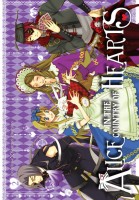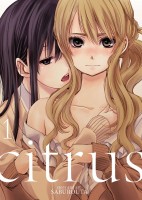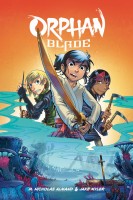My News and Reviews
Well, last week unintentionally became a week filled with gay-themed manga here at Experiments in Manga, not that that’s something I’m going to complain about. But, first things first, the WataMote manga giveaway winner was announced. The post also includes a list of otaku manga available in English for anyone looking for something to read in that sub-genre. And now, back to the gay manga! I posted two in-depth manga reviews last week. The first review was of Takeshi Matsu’s English-debut More and More of You and Other Stories, a collection of gay erotic doujinshi. It’s both a fun and funny volume, so I hope to see more of Matsu’s work translated in the future. Over the weekend, I also posted a review of What Did You Eat Yesterday?, Volume 5 by Fumi Yoshinaga. I continue to really enjoy the series’ mix of food and contemporary gay life. The sixth volume was actually released last week, so I’m a little behind in my reviews, but it’s still a great series.
Elsewhere online, Digital Manga launched its first non-Tezuka Kickstarter project, an effort to reprint and restock the first six volumes of Ayano Yamane’s Finder boys’ love series. (Like many of Digital Manga’s recent Kickstarter projects, I have mixed feelings about this one.) In licensing news, Seven Seas and Yen Press announced quite a few new titles on social media. Sean has a nice roundup of the licenses over at A Case Suitable for Treatment. For those who are interested in the history of manga or are more academically inclined, be sure to check out Ryan Holmberg’s most recent What Was Alternative Manga? column, “The Fukui Ei’ichi Incident and the Prehistory of Komaga-Gekiga” at The Comics Journal and the second part of Nicholas Theisen’s manga studies essay “Takeuchi Osamu and Manga Expression” at Comics Forum.
Quick Takes
 Alice in the Country of Hearts, Omnibuses 2-3 (equivalent to Volumes 3-6) by Soumei Hoshino. I was taken by surprise by how much I enjoyed the first omnibus of Alice in the Country of Hearts and so soon found myself tracking down the rest of the series. I became a little less enamored with the manga the more I read, but in the end I still thoroughly enjoyed the series and I definitely plan on picking up some of the spinoffs. Because Alice in the Country of Hearts is based on a romance adventure game, it’s not too surprising that Alice is eventually paired off with one of the multitude of people who have expressed intense interest in her. However, I didn’t really like who it was she ended up with in Alice in the Country of Hearts because he’s a violent jerk. Granted, I can say that and not really spoil too much since so many of the guys in the series are violent jerks—they feel so strongly for Alice that more than one of them actually wants to, or even tries to, kill her. This certainly adds to the ominous atmosphere of Alice in the Country of Hearts, which is one of the things I particularly like about the series. What I was hoping to see and what the manga doesn’t quite deliver on was more explanation about the world itself and about the “game” that is being played. I suspect some of the other Alice series may expand on this, though.
Alice in the Country of Hearts, Omnibuses 2-3 (equivalent to Volumes 3-6) by Soumei Hoshino. I was taken by surprise by how much I enjoyed the first omnibus of Alice in the Country of Hearts and so soon found myself tracking down the rest of the series. I became a little less enamored with the manga the more I read, but in the end I still thoroughly enjoyed the series and I definitely plan on picking up some of the spinoffs. Because Alice in the Country of Hearts is based on a romance adventure game, it’s not too surprising that Alice is eventually paired off with one of the multitude of people who have expressed intense interest in her. However, I didn’t really like who it was she ended up with in Alice in the Country of Hearts because he’s a violent jerk. Granted, I can say that and not really spoil too much since so many of the guys in the series are violent jerks—they feel so strongly for Alice that more than one of them actually wants to, or even tries to, kill her. This certainly adds to the ominous atmosphere of Alice in the Country of Hearts, which is one of the things I particularly like about the series. What I was hoping to see and what the manga doesn’t quite deliver on was more explanation about the world itself and about the “game” that is being played. I suspect some of the other Alice series may expand on this, though.
 Citrus, Volume 1 by Saburouta. I know quite a few people who were very excited for Citrus, Seven Seas’ most recent yuri acquisition. I didn’t know much about the series, but I’m always interested in seeing, and reading, more yuri in English. Yuzu is boisterous young woman whose life has been thrown into turmoil after her mother remarries. She has a new name, a new high school, and even a new sister. Mei and Yuzu don’t really get along that well and their relationship gets even more complicated when Mei suddenly kisses Yuzu, but not out of any sort of true affection. Yuzu’s not entirely sure what’s going on with her new sibling, but after the kiss she can’t get her out of her mind and begins to develop non-sisterly feelings for Mei. Quite a few things in the first volume of Citrus strained my suspension of disbelief—I cannot and will never be convinced that Yuzu’s mother completely failed to mention before they all actually moved into the same household together that as part of her remarriage Yuzu would be gaining a stepsister—but it is an intriguing start to the series. The manga has great potential for melodrama. Mei is somewhat of a mystery at this point, and I’m curious to learn more about her. She puts up a good front for most people, but she’s incredibly manipulative and Yuzu’s one of very few people who knows about and has seen that side of her.
Citrus, Volume 1 by Saburouta. I know quite a few people who were very excited for Citrus, Seven Seas’ most recent yuri acquisition. I didn’t know much about the series, but I’m always interested in seeing, and reading, more yuri in English. Yuzu is boisterous young woman whose life has been thrown into turmoil after her mother remarries. She has a new name, a new high school, and even a new sister. Mei and Yuzu don’t really get along that well and their relationship gets even more complicated when Mei suddenly kisses Yuzu, but not out of any sort of true affection. Yuzu’s not entirely sure what’s going on with her new sibling, but after the kiss she can’t get her out of her mind and begins to develop non-sisterly feelings for Mei. Quite a few things in the first volume of Citrus strained my suspension of disbelief—I cannot and will never be convinced that Yuzu’s mother completely failed to mention before they all actually moved into the same household together that as part of her remarriage Yuzu would be gaining a stepsister—but it is an intriguing start to the series. The manga has great potential for melodrama. Mei is somewhat of a mystery at this point, and I’m curious to learn more about her. She puts up a good front for most people, but she’s incredibly manipulative and Yuzu’s one of very few people who knows about and has seen that side of her.
 Orphan Blade written by M. Nicholas Almand and illustrated by Jake Myler. After previewing some of Myler’s work in progress for Orphan Blade, I was really looking forward to reading the graphic novel. Unfortunately, while there were some aspects of the comic that I really appreciated (it’s nice to see a gay protagonist), overall I was disappointed with Orphan Blade, especially since it had such great potential. The setting is an alternate-universe, 17th-century Japan in which the world was overrun with kaijū. But now that most of the monsters have been destroyed, humans are once again at war with each other. Particularly coveted are Artifacts, weapons of immense power fashioned out of the bodies and bones of the defeated kaijū. Hadashi is a young man who comes into possession of one of those Artifacts, but it possesses him in return. For the most part, Myler’s artwork is excellent. The monster and character designs, while lacking cohesiveness, are great and I love the colors. Orphan Blade is surprisingly violent, bloody, and gruesome. There are plenty of dynamic battles, however the action is frequently confusing and difficult to follow which is particularly problematic since a large part of the graphic novel is devoted to fight sequences. I like the world and basic premise of Orphan Blade, but the story feels inexpertly cobbled together in places, which may be explained by the fact that Almand sadly passed away before the comic’s completion.
Orphan Blade written by M. Nicholas Almand and illustrated by Jake Myler. After previewing some of Myler’s work in progress for Orphan Blade, I was really looking forward to reading the graphic novel. Unfortunately, while there were some aspects of the comic that I really appreciated (it’s nice to see a gay protagonist), overall I was disappointed with Orphan Blade, especially since it had such great potential. The setting is an alternate-universe, 17th-century Japan in which the world was overrun with kaijū. But now that most of the monsters have been destroyed, humans are once again at war with each other. Particularly coveted are Artifacts, weapons of immense power fashioned out of the bodies and bones of the defeated kaijū. Hadashi is a young man who comes into possession of one of those Artifacts, but it possesses him in return. For the most part, Myler’s artwork is excellent. The monster and character designs, while lacking cohesiveness, are great and I love the colors. Orphan Blade is surprisingly violent, bloody, and gruesome. There are plenty of dynamic battles, however the action is frequently confusing and difficult to follow which is particularly problematic since a large part of the graphic novel is devoted to fight sequences. I like the world and basic premise of Orphan Blade, but the story feels inexpertly cobbled together in places, which may be explained by the fact that Almand sadly passed away before the comic’s completion.

Leave a Reply